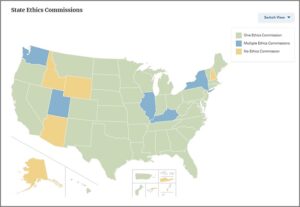Wyoming in Dark Ages When it Comes to Ethics, Dec 7, 2024.
Most states have an Ethics Commission to keep government officials accountable and honest. Wyoming is not in that group:

Map from https://www.ncsl.org/ethics/state-ethics-commissions
Conflict of Interest is a glaring problem in our state legislature and our Legislative Management Council seems to be perfectly fine with that. But we are not. 307 Votes focuses on conflicts of interest for every legislator and if we find any we call it out.
A large part of the problem is that the legislators are expected to admit their conflict – whether they actually do or not is never addressed unless a complaint is filed. If a complaint is filed, and addressed, it is handled confidentially – out of public view and awareness.
Another issue is that the guidelines and statutes create confusion and opacity rather than clarity.
With the absence of an official commission to keep legislators honest and accountable, a basic rule of thumb was laid out in 1997 by WY Attorney General William Hill. A 2015 Wyofile article, Does Wyoming Legislature take a casual attitude toward ethics?, describes this opinion:
“(P)ublic confidence in the integrity of the government is fundamental to our system of representative democracy,” Hill wrote.
For that reason many other states require officials to “scrupulously avoid acts which may create an appearance of misconduct.” In other words, officials should steer clear of anything that merely looks bad.
“It is possible that the appearance of impropriety can undermine the public’s confidence in the lawmaking process just as effectively as an actual impropriety,” Hill wrote.
Hill urged lawmakers to self-police when a potential conflict of interest becomes a matter of controversy: “In situations where … the public perception is that a conflict of interest exists, the legislator should be cognizant of creating the appearance of impropriety, and weigh that as a factor when deciding whether to vote, or to declare a conflict and abstain from voting, on a particular measure.”
Throughout the course of a session, lawmakers regularly declare conflicts of interest, sometimes at the urging of their colleagues. While there is a process for handling ethics complaints made by the public, legislative leaders have the authority to dismiss complaints with no recourse to the whistleblower.
“It’s a system that relies almost exclusively on people’s own judgments and a small degree of peer pressure,” Wolfe said.
We agree with most of of that. We do not agree, however, with the statement that “Throughout the course of a session, lawmakers regularly declare conflicts of interest“.
It has been our observation that legislators seldom declare a conflict of interest.
To prove our point, we encourage our readers to check the Roll Call Votes on any Digest page, for any bill, for any year. What you will find is that the official category for Conflict Votes is almost always recorded as zero:

Here is a recent example of a Conflict of Interest of former Senator Fred Baldwin:
Professionally, Baldwin is a Physician Assistant. A 2017 bill that Baldwin sponsored, SF0021 – Death certificates, authorizes Physician Assistants to certify death certificates – and so he advanced the responsibilities (and perhaps fees) he enjoys in his profession.
Not only did Baldwin sponsor the bill, he also voted on it.
Additional discussion:
Sometimes legislators admit a conflict and recuse themselves from voting, but then later vote on the bill in a different Roll Call.
Case in point: 2023 SF0013 – Bar and grill liquor license phaseout. Senators Case, Driskill and McKeown all acknowledged they had a conflict of interest with the bill, yet they still sometimes voted on it (see digest page). Either it’s a conflict or not – there should be no gray area that they all dance around later.
